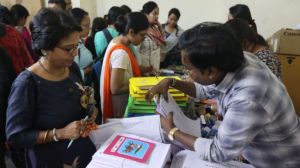In quota146;s defence
There are no fewer than five pieces on reservations in the latest issue of People8217;s Democracy including one on 8216;the dark world of the media8217; ...

There are no fewer than five pieces on reservations in the latest issue of People8217;s Democracy including one on 8216;the dark world of the media8217; that focuses on the 8216;upper caste domination in the media8217;. Defending quotas, writer Bhalchandra Mungekar describes the obvious tyranny of the upper castes, saying the 8216;attack8217; on the government8217;s decision on OBC quotas higher education is so virulent that the 8216;8216;country at large is made to believe8217;8217; that quotas would jeopardise merit and efficiency. However, in doing so the 8216;8216;defenders of merit8217;8217; end up condemning nearly 80 per cent of the population comprising SCs, STs and OBCs. The other arguments are a repeat of what has been said before: that merit is a product of 8216;8216;socio-material and cultural conditions8217;8217;, that given the higher dropout rates among the SCs, STs, they cannot be compared to those from the upper castes. Drawing an analogy with the protection provided to domestic industry, the author says that reservation is a way of seeking a level playing field for the depressed sections.
Venkatesh Athreya8217;s article says that while upper caste students will be discriminated during admissions because a non-upper caste student with lower scores could be admitted in his place, it cannot be equated with the 8216;8216;macro social and historical injustice of denial of opportunity to the lower castes.8217;8217;
Defining office of profit
The other major issue covered by People8217;s Democracy is the Left8217;s stand on the Office of Profit. The editorial 8216;Parliament should prevail8217; attempts to set the record straight on the 8216;8216;plain nonsense being said8217;8217; on the subject by saying that every non-legislative post is not an office of profit and the Parliament alone has the 8216;8216;basic right8217;8217; under the Constitution to decide which posts are exempt from disqualification. Till the term 8216;Office of Profit8217; has been defined, Parliament will have to exempt offices held by MPs by amending the Prevention of Disqualification Act.
The editorial8217;s anger is as much directed against The Indian Express for 8216;8216;accusing the Party of attacking the Election Commission and the President to protect the offices of profit of its MPs8217;8217;. The editorial says the CPM is not apologetic about its criticism of the Election Commission for the way it handled the Trinamool Congress8217;s complaint against the CPM MPs, and the 8216;8216;preferential treatment8217;8217; given to Trinamool Congress complaints during the Assembly elections in West Bengal.
Gaps in the Guarantee
While assuring the government of the fullest cooperation from the CPM in the implementation of the Rural Employment Guarantee Act, CPM MP Brinda Karat points to shortcomings in its implementation in a letter to Rural Development Minister Raghuvansh Prasad Singh. One is about payment of wages lower than those specified in the Act. According to her, in 89 of the 200 districts workers were paid less than Rs 60. So, workers often waited for higher paid work. In Karnataka, she writes, most workers in REGA projects were women because the men were not willing to work at such low wages.
8216;8216;States should be allowed to fix their wage taking into account the higher prices of essential commodities,8217;8217; Karat writes to the minister. She refers to the direction to states to conduct time and motion studies to fix a fair norm for piece rated work but points out specific cases of 8216;8216;impossible work norms8217;8217; for workers to earn a minimum wage. She insists on the importance of gender disaggregated data because it is required under the Act that a third of the beneficiaries are women.
8212;Compiled by Ananda MajumdarIn quota8217;s defence
There are no fewer than five pieces on reservations in the latest issue of People8217;s Democracy including one on 8216;the dark world of the media8217; that focuses on the 8216;upper caste domination in the media8217;. Defending quotas, writer Bhalchandra Mungekar describes the obvious tyranny of the upper castes, saying the 8216;attack8217; on the government8217;s decision on OBC quotas higher education is so virulent that the 8216;8216;country at large is made to believe8217;8217; that quotas would jeopardise merit and efficiency. However, in doing so the 8216;8216;defenders of merit8217;8217; end up condemning nearly 80 per cent of the population comprising SCs, STs and OBCs. The other arguments are a repeat of what has been said before: that merit is a product of 8216;8216;socio-material and cultural conditions8217;8217;, that given the higher dropout rates among the SCs, STs, they cannot be compared to those from the upper castes. Drawing an analogy with the protection provided to domestic industry, the author says that reservation is a way of seeking a level playing field for the depressed sections.
Venkatesh Athreya8217;s article says that while upper caste students will be discriminated during admissions because a non-upper caste student with lower scores could be admitted in his place, it cannot be equated with the 8216;8216;macro social and historical injustice of denial of opportunity to the lower castes.8217;8217;
Defining office of profit
The other major issue covered by People8217;s Democracy is the Left8217;s stand on the Office of Profit. The editorial 8216;Parliament should prevail8217; attempts to set the record straight on the 8216;8216;plain nonsense being said8217;8217; on the subject by saying that every non-legislative post is not an office of profit and the Parliament alone has the 8216;8216;basic right8217;8217; under the Constitution to decide which posts are exempt from disqualification. Till the term 8216;Office of Profit8217; has been defined, Parliament will have to exempt offices held by MPs by amending the Prevention of Disqualification Act.
The editorial8217;s anger is as much directed against The Indian Express for 8216;8216;accusing the Party of attacking the Election Commission and the President to protect the offices of profit of its MPs8217;8217;. The editorial says the CPM is not apologetic about its criticism of the Election Commission for the way it handled the Trinamool Congress8217;s complaint against the CPM MPs, and the 8216;8216;preferential treatment8217;8217; given to Trinamool Congress complaints during the Assembly elections in West Bengal.
Gaps in the Guarantee
While assuring the government of the fullest cooperation from the CPM in the implementation of the Rural Employment Guarantee Act, CPM MP Brinda Karat points to shortcomings in its implementation in a letter to Rural Development Minister Raghuvansh Prasad Singh. One is about payment of wages lower than those specified in the Act. According to her, in 89 of the 200 districts workers were paid less than Rs 60. So, workers often waited for higher paid work. In Karnataka, she writes, most workers in REGA projects were women because the men were not willing to work at such low wages.
8216;8216;States should be allowed to fix their wage taking into account the higher prices of essential commodities,8217;8217; Karat writes to the minister. She refers to the direction to states to conduct time and motion studies to fix a fair norm for piece rated work but points out specific cases of 8216;8216;impossible work norms8217;8217; for workers to earn a minimum wage. She insists on the importance of gender disaggregated data because it is required under the Act that a third of the beneficiaries are women.
8212;Compiled by Ananda Majumdar
- 01
- 02
- 03
- 04
- 05































